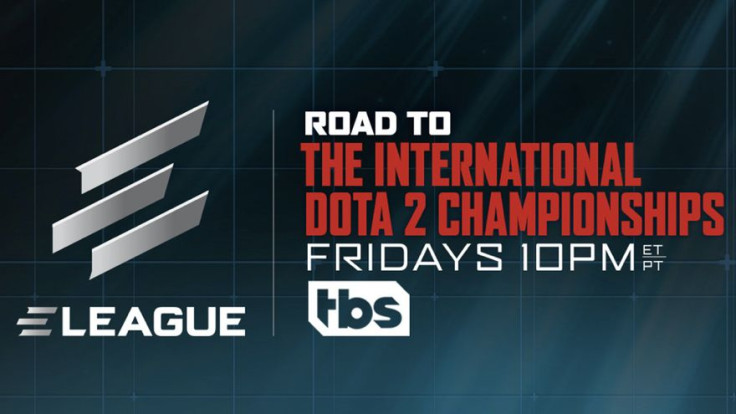ELEAGUE’s first foray into the world of professional Dota 2 begins this week with ELEAGUE: Road To The International Dota 2 Championships, a four-part documentary that follows two teams, Complexity Gaming and OG, on the road to TI7. It’s the first time ELEAGUE is dipping its toes into MOBA waters, after a year of spotlighting CS:GO and Street Fighter V , and the first non-competitive esports programming on TBS. But Turner Sports Executive Vice President and Chief Content Officer Craig Barry is confident there’s still plenty of space to keep growing.
“This is a fluid space. And it’s super important to be fluid in the space, not just hang your hat on one publisher or one approach. So when it comes to Dota, obviously The International is one of the biggest stages,” Barry told Player.One. “We found an opportunity to be able to create content around the narrative of the teams and [TI7], engaging with the event, preparing for the event and participating in the event. To create storylines…in the same vein that Hard Knocks or [HBO Sports’] 24/7 would create content around specific teams. And we think that there’s a real appetite in the communities for this storytelling. We also feel as though, when you approach esports from more of a storytelling narrative, there’s an opportunity to reach a wider audience. Not only the hardcore fans, but the casual ones as well.”
Most of ELEAGUE’s programming during its 15 months has focused on actual competition. Two 10-week seasons of live Counter-Strike introduced millions to Valve’s team shooter and ELEAGUE’s SFV programming has given fighting game fans something other than EVO and CEO to celebrate on a national stage. But individual stories can get lost in the shuffle. CS:GO squads spend about a week in Atlanta before their matches, giving interviews and helping create content to promote ELEAGUE ahead of Friday’s live matches. The league tries to pursue interesting stories when they surface, either to pad out that week’s broadcast or give them something to promote that week’s matches on social media. But some programming needs a 60-minute time slot, like Complexity and OG’s journey in Road to the International.
“We believe in straddling the line of sports and pop culture,” said Barry. “Great stories are great stories. But also creating an opportunity where people can learn how to play, and learn how to watch, and get more emotionally invested in the content, is something, quite frankly, that can’t be overlooked. As important as the competition is, and making sure we’re authentic in all the content, we also have to be really considerate of the way we tell stories.”
Knowing how to tell stories isn’t the only thing that’s important though. It’s just as important to know where you’re audience will be looking for that content.
“Not all platforms are created equal,” he acknowledged. “Sometimes what we distribute on Twitter or Facebook or on our proprietary ELEAGUE.com platform works better than what we produce and distribute on TBS.”
The goal is to put ELEAGUE in places where the organization believes it can reach underserved audiences. The organization hopes to push Capcom out of the Street Fighter scene or Valve out of the competitive CS:GO and Dota 2. It’s actually working with the latter on the ELEAGUE Major 2017, the organization’s first time partnering directly with a publisher on a tournament for one of its titles. Barry says ELEAGUE would rather fill in the gaps, as it has with its behind-the-scenes look at The International. It also wants to explore new territory, part of the motivation behind ELEAGUE’s recent partnership with Geico for the Amateur Series.
“We’re in the hardcore exploratory phase with our content creation. We’re super interested in the amateur community and how big that is,” Barry said. “There’s a real opportunity to create content around that side. To create engagement and a relatively large amateur event. Even the casual community, who’s just interested in learning and watching, I think that’s all in consideration when we talk about our strategy.”
Creating compelling television is also a big part of ELEAGUE’s strategy. Barry says Turner and WME/IMG, the companies behind ELEAGUE, know that the best esports content will typically be optimally served on digital platforms like Twitch or Mixer. But the chance to broadcast on TBS, which tends to have a less rigid audience than some of the other networks with occasional esports programming, can be helpful for expanding the audience.
“When you’re putting [esports] on ESPN, which is a hardcore traditional sports network, you’re going to have confusion from both sides,” Barry told Player.One.
Esports fans and competitors both generally acknowledge that television time adds legitimacy to their favorite games, even if they don’t understand why, but younger audiences don’t like to organize their lives around a television schedule. And hardcore sports fans tend to reject the idea that esports coverage belongs on the same channel as SportsCenter.
“On TBS, I think we approach [entertainment as a portal]. We’re not expecting you to be hardcore esports fans,” he added. “If you want to be a hardcore fan, then ultimately you’re going to convert to a digital platform like Twitch or YouTube. But we’re trying to create a portal that says ‘Look, this isn’t just about the competition. This is about the culture of esports. The lifestyle of esports.’ And, quite frankly, trying to give people an opportunity to learn about it through this platform.”
Road to the Internationa l is a four-part series from TBS and ELEAGUE. The first episode airs tonight, Aug. 4, at 10 p.m. EDT and the series will continue at the same time every Friday throughout the month of August. Dota 2 is currently available on Windows and OS X. The Main Event for this year’s world championship tournament, The International, begins Aug. 7.
Be sure to check back with Player.One and follow Scott on Twitter for more Dota 2 coverage in 2017 and however long Valve supports Dota 2 in the years ahead.



















